Baseball in Wonderland: History, title on line in Game 7 that will be unlike any ever played

Watch Game 7 of the 2016 World Series live on Fox at 8 p.m. ET, or stream it on Fox Sports Go by clicking here.
CLEVELAND—Live bear cubs, magicians, penguins, mimes, a 1979 conversion van with shag carpeting: Cubs manager Joe Maddon runs a baseball team the way Bill Murray might if they ever let the Cubs’ biggest celebrity fan be in charge. But even The Great Maddonini, as his forefathers were known in their neighborhood west of Rome, outdid himself in Game 6 of the World Series Tuesday. Forget Murray; Maddon went all Carl Spackler on the Fall Classic.
Needing to win two games against Cleveland, not just one, and two days removed from pushing closer Aroldis Chapman for a career-high eight outs in Game 5, Maddon summoned his closer with two outs in the seventh inning with a five-run lead and sent him back out for the ninth with a seven-run lead.
Warning: Do not try to manage along with Maddon. It is known to cause dizziness, nausea and dry mouth. Consult your physician if you can actually figure out what he’s doing.
“No, I gave up a long time ago,” said Cubs first baseman Anthony Rizzo. “But you know, [Reds first baseman] Joey Votto told me a while ago that the more Chappy pitches, the stronger he gets. I’ve seen it.”
Said Chapman, who has thrown 62 pitches in the past three days, through a translator, “I do feel stronger the more I pitch. I can’t say if that is actually the case, but I do feel stronger.”
Maddon managed the games in Chicago with a wool ski cap atop his noggin. On Tuesday night, you had to check if his choice of headgear this time was a top hat affixed with a tag that read, “In This Style, 10/6.” Through the looking glass went Maddon and his Cubs, all the way to the sweetest words in all of sports: World Series Game 7.
World Series: Seven thoughts on Game 7 between the Cubs and the Indians
Game 7 is the ultimate sports event. No sport distills more hard work into one night, and never has it been truer than it will be Wednesday night. The Indians and Cubs have combined to play 413 games over nine months this year and between them have waited 176 years for their next world championship—a record combined drought for any of the 112 World Series.
This is baseball as written by John Steinbeck. Since they last won the World Series, the Cubs, whose last title came in 1908, have been within one win of a championship just once: Game 7 in 1945 at Wrigley Field, which they lost to Detroit. The Indians, whose most recent championship was in 1948, have been within one win of a title four times. They are 0–3 in those games, losing Game 7 to the Marlins and two in this series. Somebody has to win tonight—unless the rain in the forecast intercedes.
The madness of Game 6 turned out just fine for Maddon—Chapman threw only 20 pitches despite what could have been an unnecessary 40-plus-pitch outing—because Javier Baez has the hands of a jeweler and Rizzo is a beast of a hitter. Baez turned a wondrous double play in the eighth by catching a poor feed from shortstop Addison Russell at his ankles and, without bothering to slow his movements, fired a sidearm strike to first on the run. It was the equivalent of running across four lanes of Michigan Avenue traffic while throwing a baseball through the open back window of a parked car. The double play saved Chapman extra pitches, as did a two-run home run Rizzo hit in the top of the ninth that made the score 9–2.
• Cubs Hub: Check out all of SI's content as Chicago chases history
But why did Maddon bring Chapman into a 7–2 game in the first place with seven outs to go, even if there were two runners on base?
“The middle of the batting order was coming up: [Francisco] Lindor, [Mike] Napoli, [Jose] Ramirez possibly,” Maddon said. “So I thought the game could have been lost right there if we did not take care of it properly.”
Said Cubs pitching coach Chris Bosio of his boss, “He’s attacking every at-bat to win the game. He got exactly the matchups he wanted. That’s why Joe’s Joe. He got exactly what he wanted. He wanted to stop it right there. And if we could hold it right there I think he felt pretty good that we could add two more points the way we were swinging the bats.”
I found it to be an unnecessary risk, one that showed a little anxiousness and a very little faith in his other relievers. The risk was that Chapman would get so extended that his effectiveness and length for a Game 7 would be compromised. Who would have been behind Chapman if he withered and couldn’t finish the job in Game 6? Bosio said Maddon would have matched up some combination of righties Pedro Strop, Justin Grimm and Hector Rondon and lefty Travis Wood on Cleveland's hitters.
The 10 Greatest World Series Game 7s
Cubs-Indians (2016)
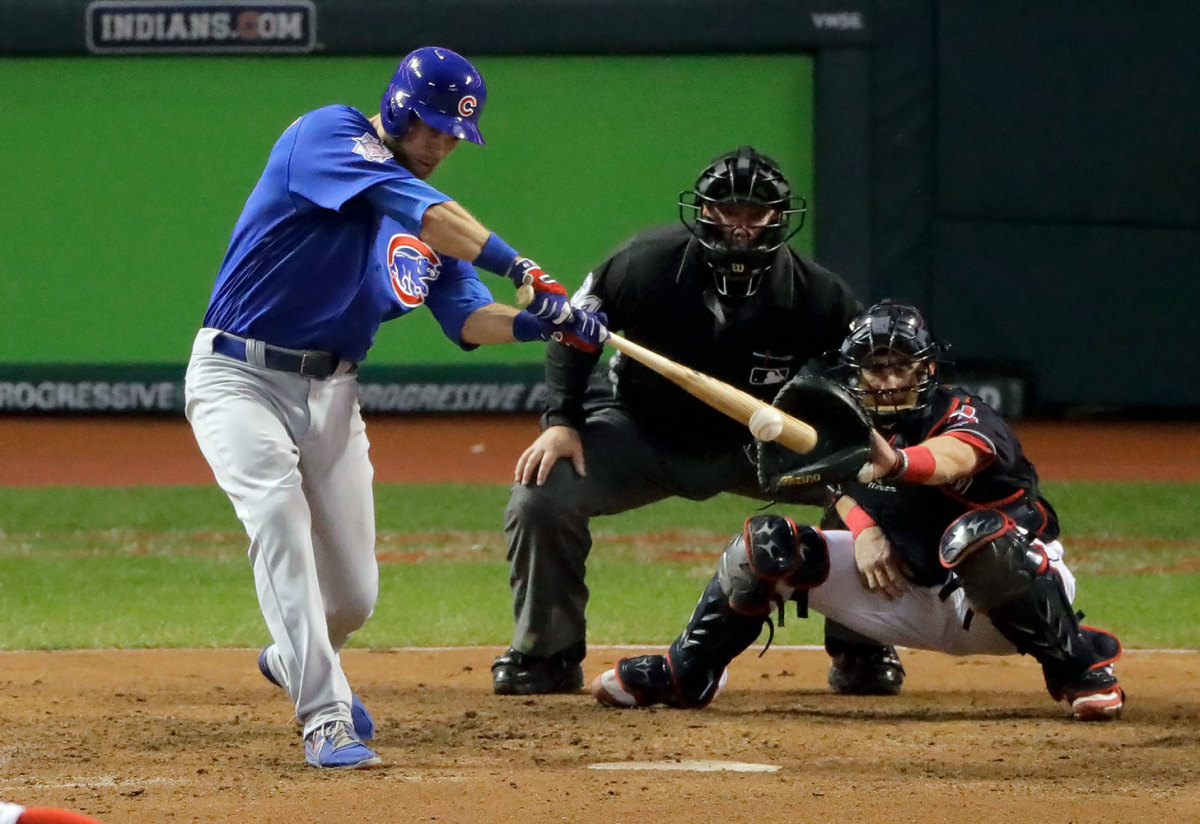
Ending more than a century of flops, futility and frustration, the Cubs won their first title since 1908, outlasting the Cleveland Indians 8-7 in 10 innings of a Game 7 thriller. All-Star closer Aroldis Chapman blew a three-run lead for Chicago with two outs in the eighth when Rajai Davis hit a tying home run. But the Cubs, after tormenting their fans one more time, came right back after a 17-minute rain delay before the top of the 10th. Ben Zobrist (named World Series MVP) hit an RBI double and Miguel Montero singled home a run to make it 8-6. Davis then delivered an RBI single with two outs in the bottom half of the 10th, but Mike Montgomery closed it out for Chicago.
Diamondbacks-Yankees (2001)
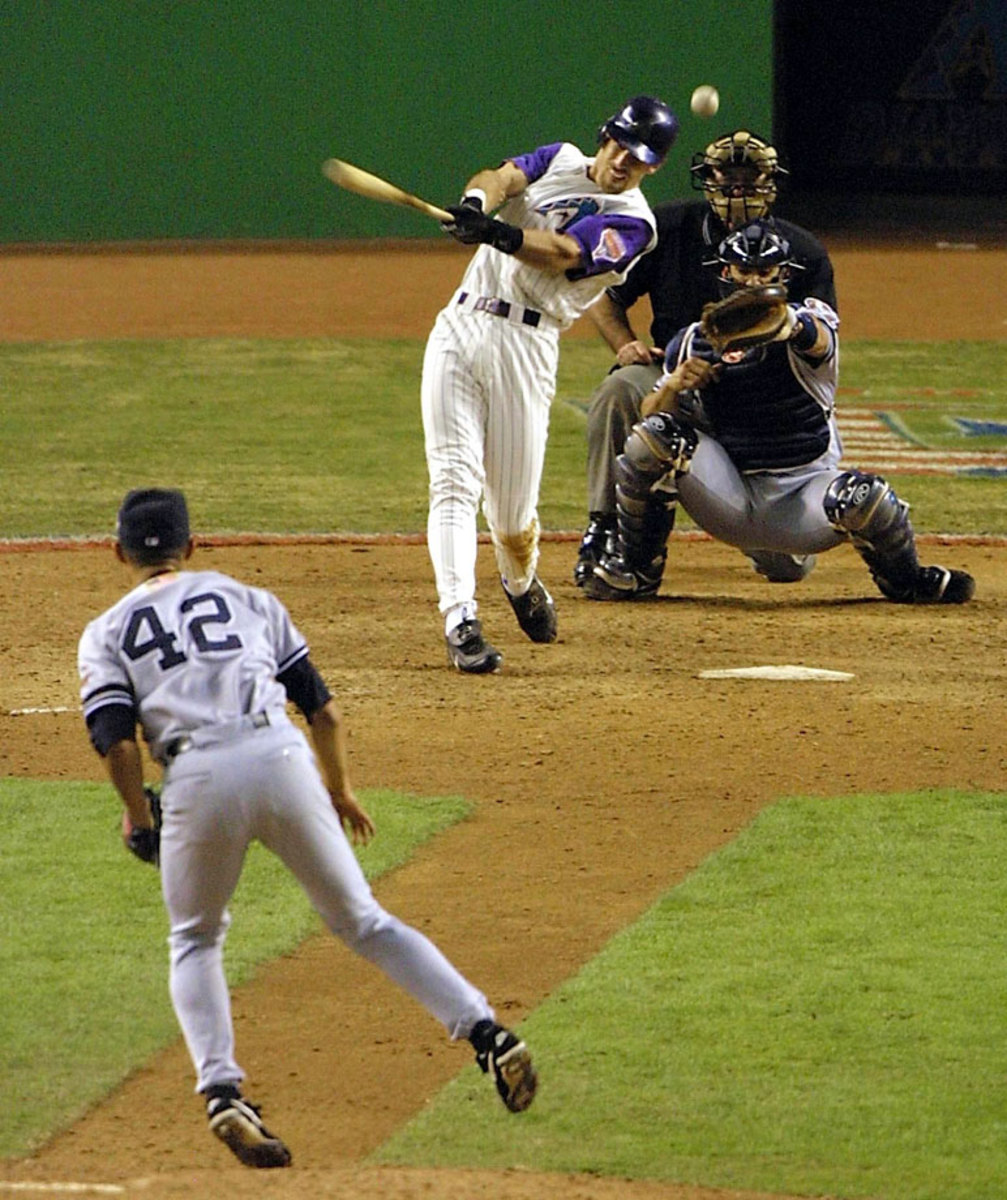
The best postseason closer in baseball was holding a 2-1 lead going into the bottom of the ninth. Nevermind what the dandy D-Back duo of Curt Schilling and Randy Johnson had done earlier. The Yanks looked like a lock. But Mariano Rivera got himself in trouble, and Luis Gonzalez won the game 3-2 with a bases-loaded bloop single over a drawn-in shortstop Derek Jeter. Johnson got the win in relief.
Marlins-Indians (1997)
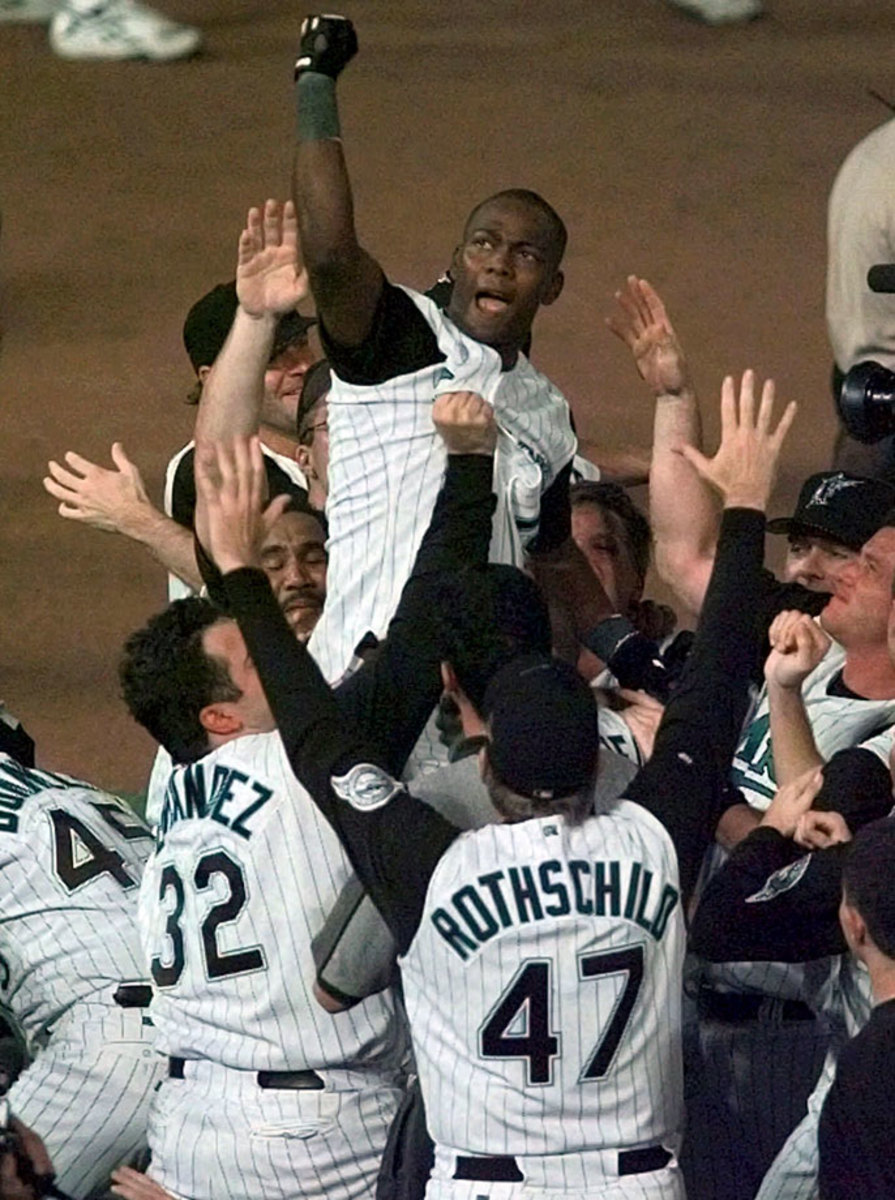
Craig Counsell came home with the winning run in the bottom of the 11th on Edgar Renteria's solid base hit to center, giving the Marlins a 3-2 win and a World Series title only five years into their existence.
Twins-Braves (1991)
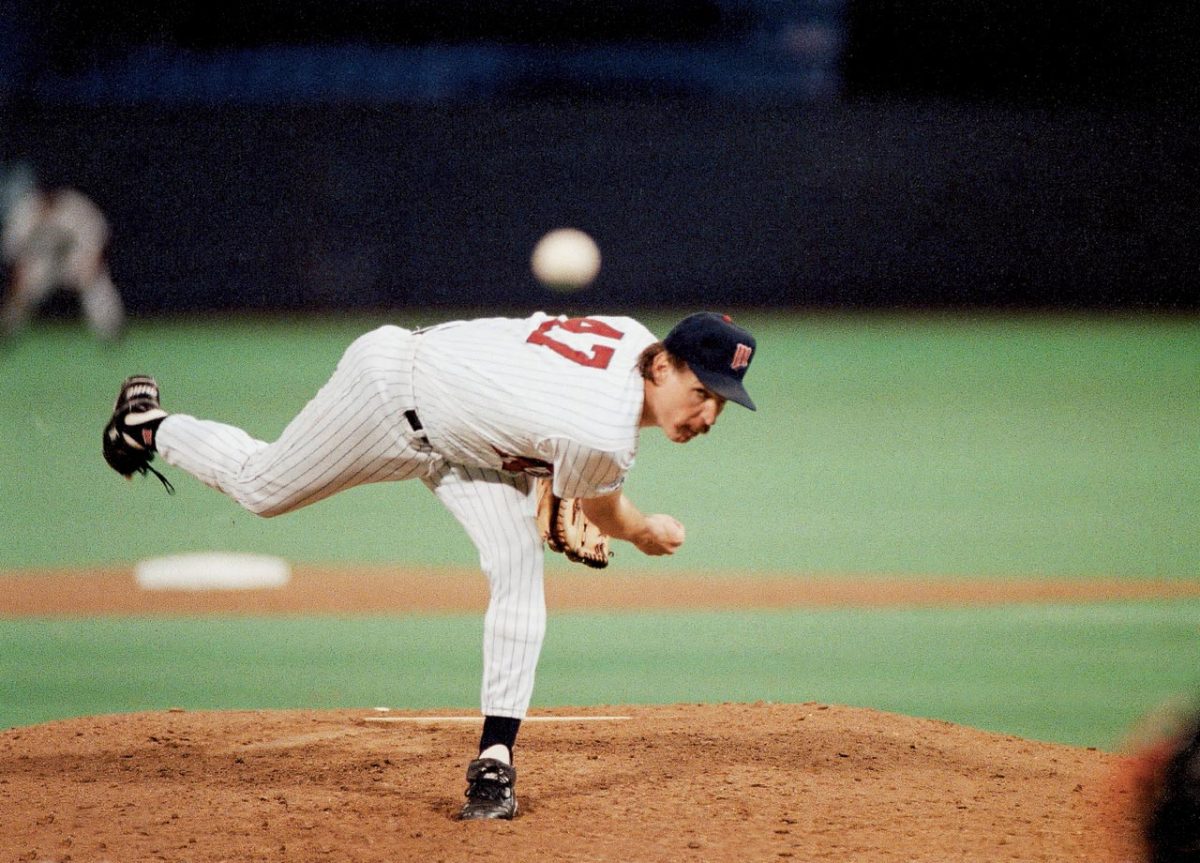
Minnesota's Jack Morris and the Braves' John Smoltz, Mike Stanton and Alejandro Pena locked up in a scoreless duel. The Twins' Gene Larkin singled home Dan Gladden with the winning run with one out in the bottom of the 10th to give Minnesota its second World Series title in five seasons.
Dodgers-Twins (1965)
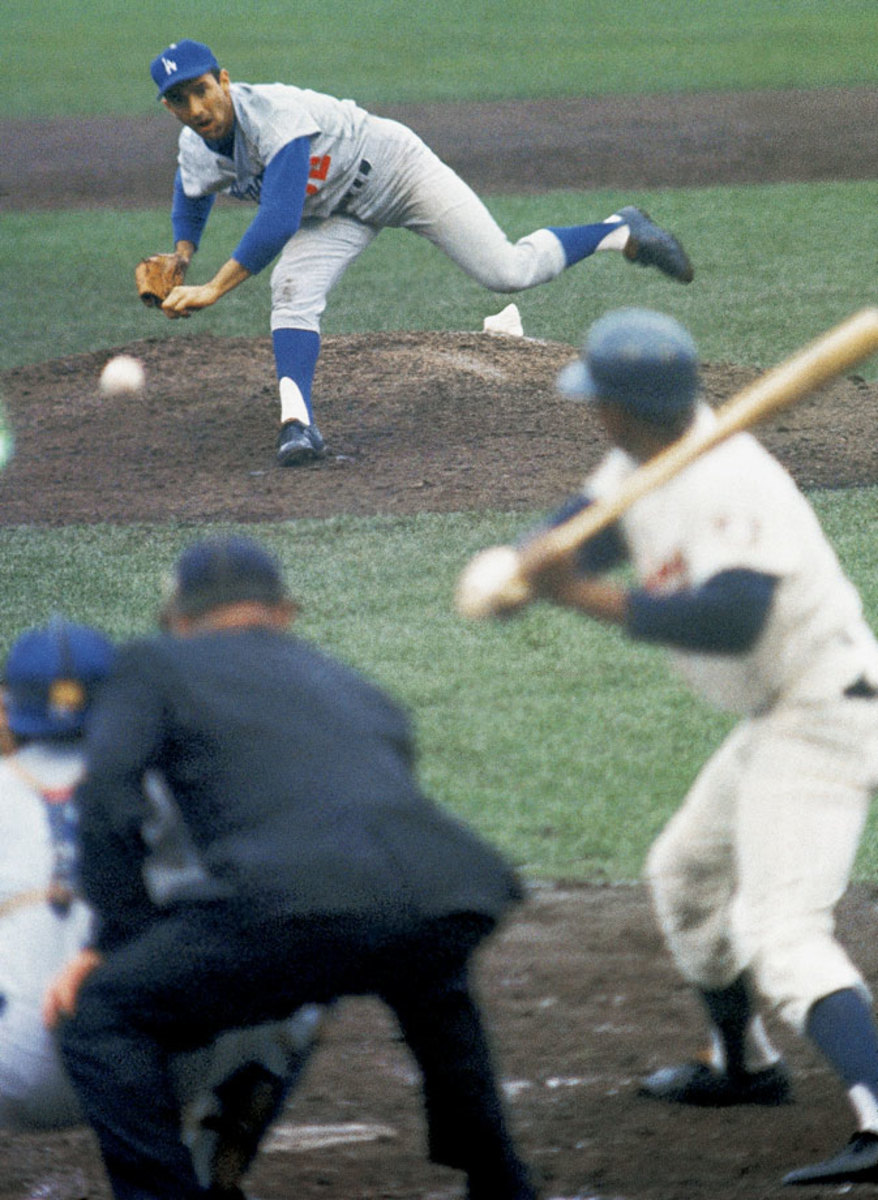
After throwing a shutout in Game 5, Hall of Fame left-hander Sandy Koufax returned on two days rest and did it again, striking out 10 to win the clincher 2-0.
Yankees-Giants (1962)
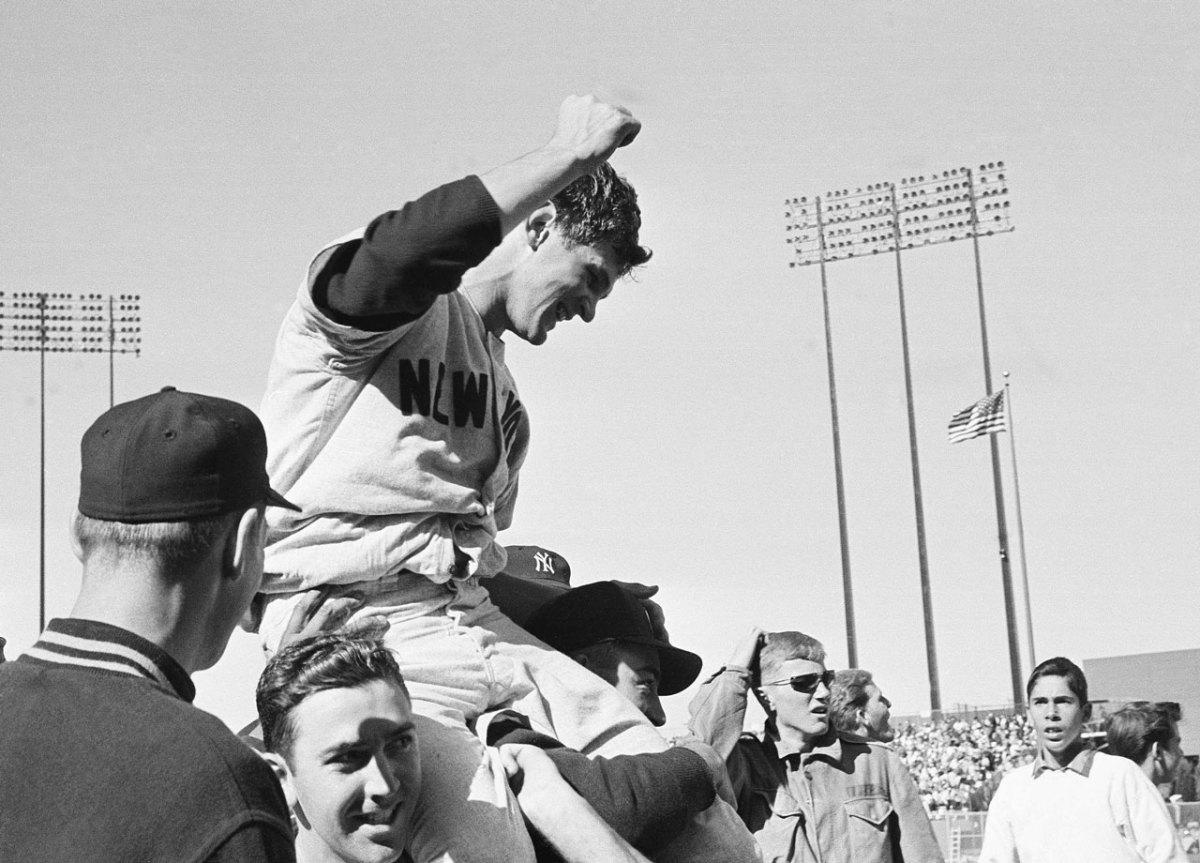
Ralph Terry, the goat of the 1960 Game 7 loss to the Pirates, was on the mound again in the ninth, but this time he came out a winner as Giants slugger Willie McCovey lined out to to second baseman Bobby Richardson for the final out of the 1-0 game.
Pirates-Yankees (1960)
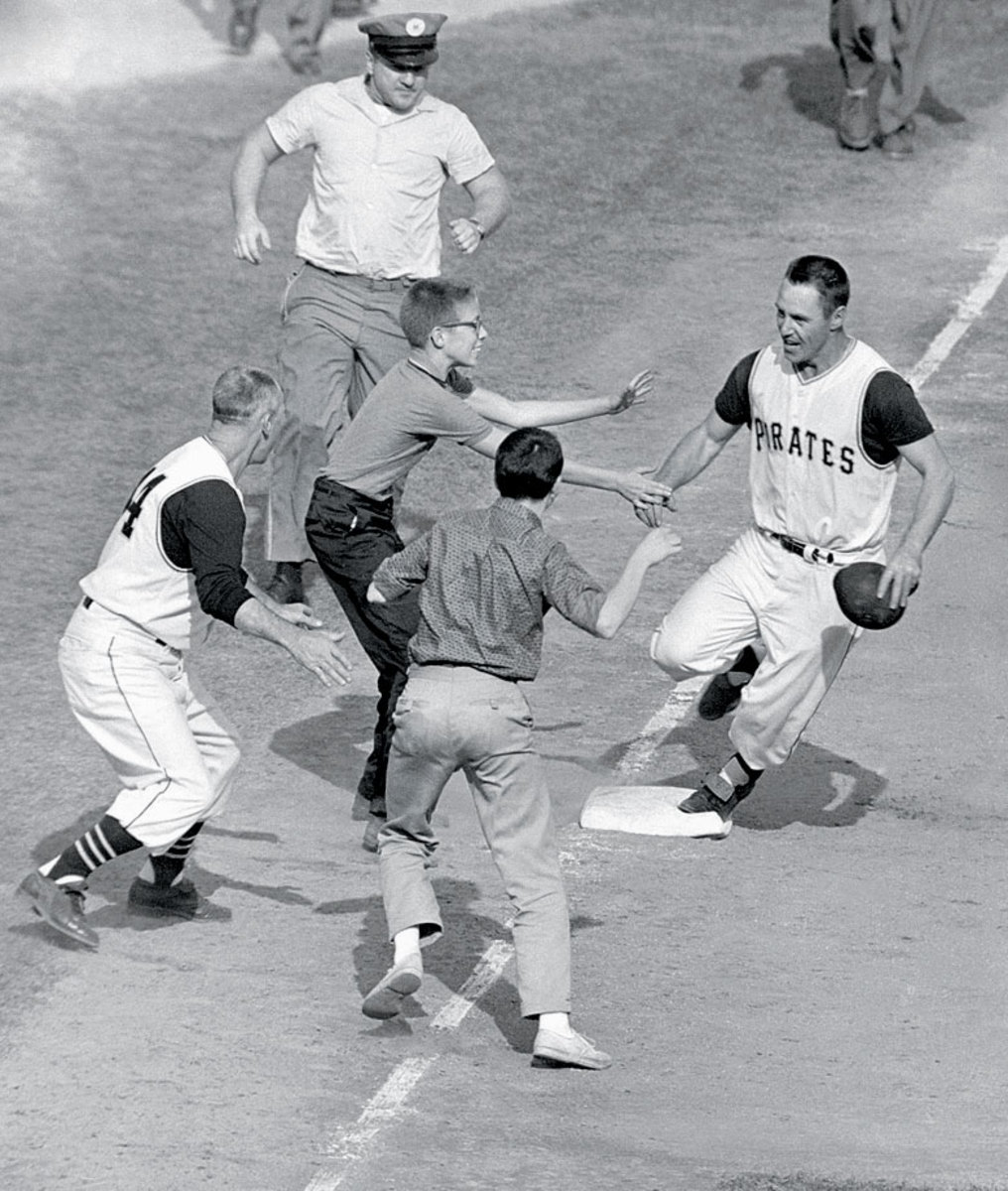
Bill Mazeroski opened the bottom of the ninth with a home run off Ralph Terry of the Yankees to give the Pirates a 10-9 victory and the World Series in seven games.
Dodgers-Yankees (1955)
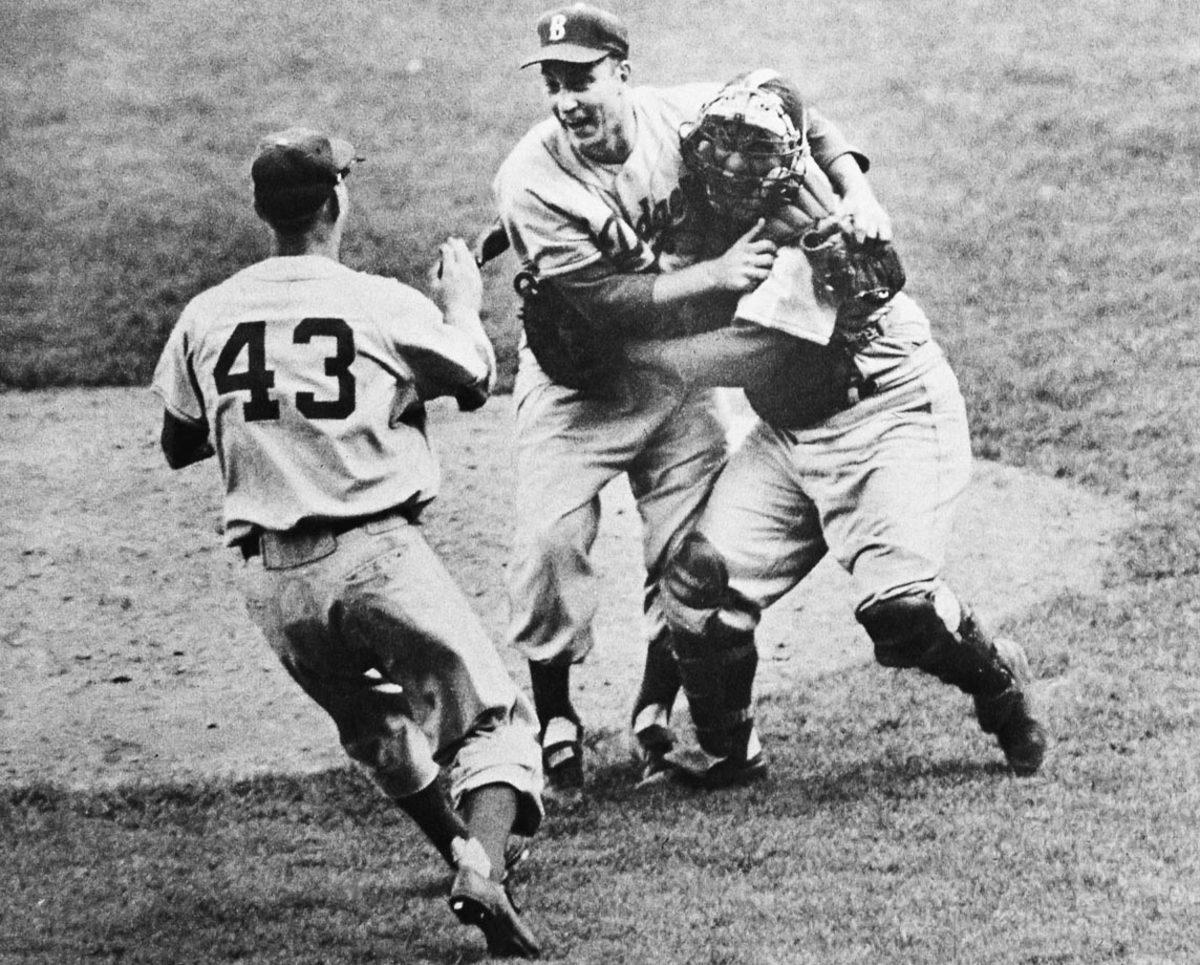
Johnny Podres became a Brooklyn legend when he pitched the Dodgers to their first World Series title. Podres went 9-10 in the regular season before beating the crosstown Yankees in Games 3 and 7, the latter a 2-0 shutout at Yankee Stadium.
Cardinals-Red Sox (1946)
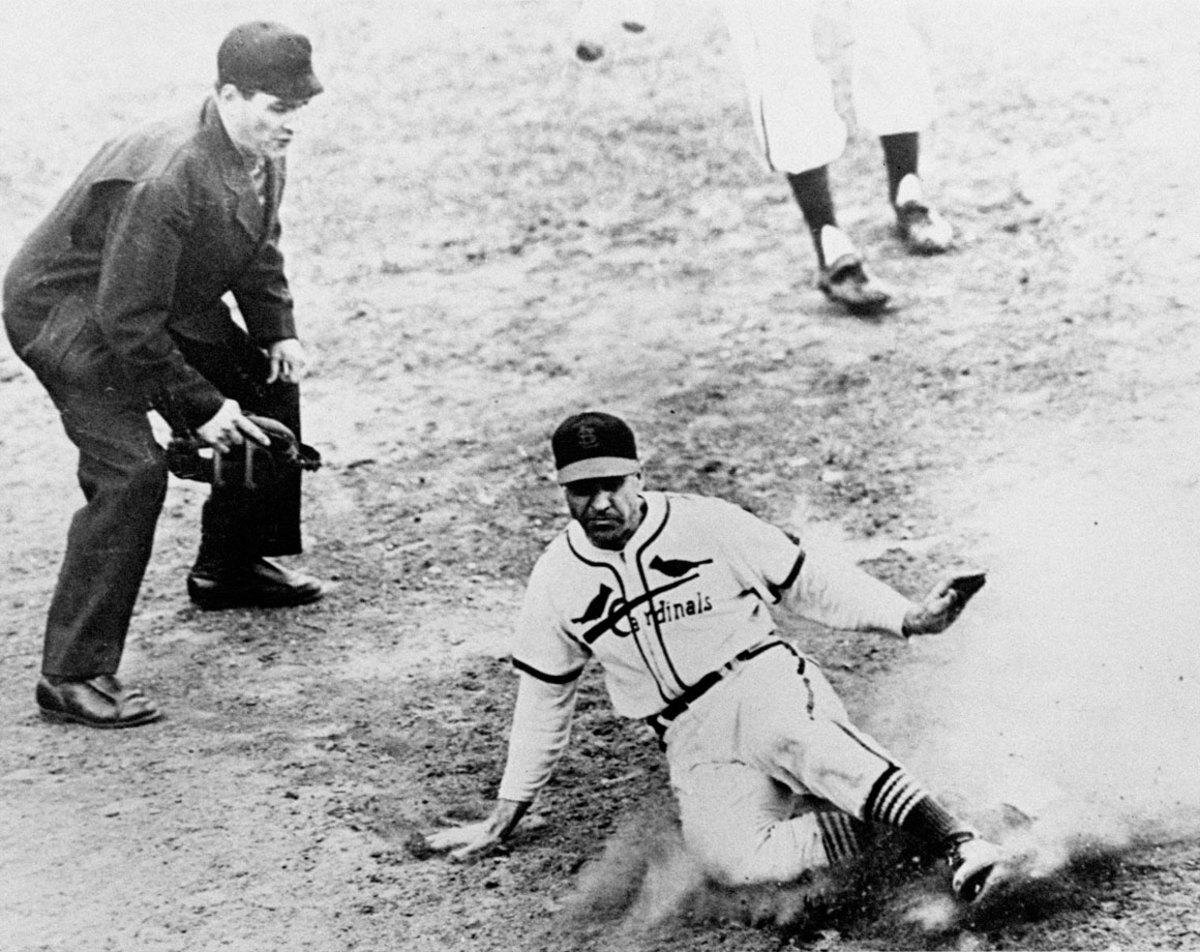
Boston shortstop Johnny Pesky hesitated before throwing home, and Enos Slaughter scored all the way from first base on an eighth-inning double by Harry "The Hat" Walker to give the Cards a 4-3 victory.
Senators-Giants (1924)
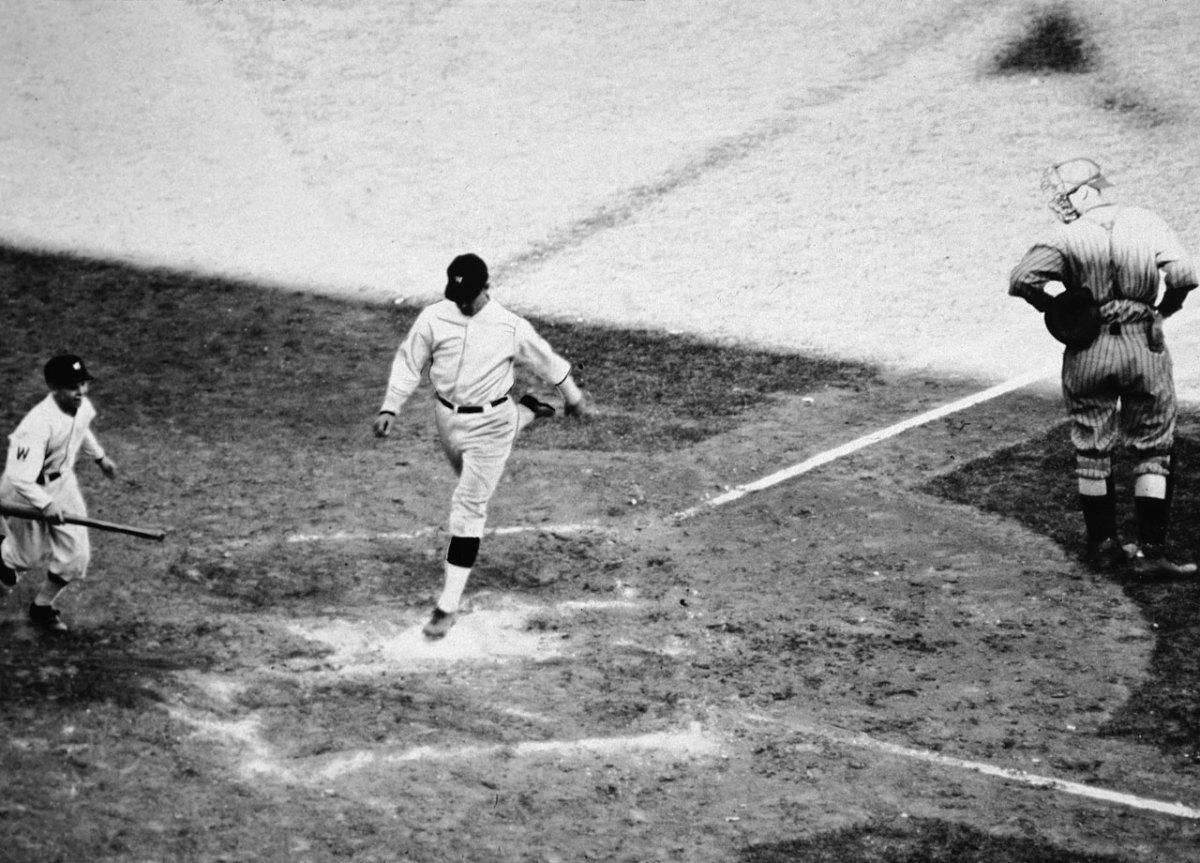
The Nats (as the Washington Senators were commonly known then) were destined and won 4-3 in 12 innings, but not without the help of two key errors and two bad-hop hits that jumped over the head of third basemen Freddie Lindstrom. Player/manager Bucky Harris (pictured) knocked in three of the Senators four runs. Pitching in relief, Hall of Famer Walter Johnson got the win.
When Rizzo hit his homer to put Chicago up seven runs with three outs to go, Maddon didn’t immediately move to the bullpen phone. Instead, he stood next to Bosio in the dugout and the two of them talked and talked and talked, looking for all the world like the Mad Hatter and the March Hare sitting down for tea. What was there to talk about?
“I told him that 92% of Chapman’s saves were in the 20-pitch window, so this was nothing for him at that point,” Bosio said. “We’ve got plenty of guys to match up against them in the ninth. He agreed.”
Maddon finally gave the go-ahead for Bosio to call the bullpen to get Strop warm. Chapman walked leadoff hitter Brandon Guyer in the ninth, as if to underscore the danger behind asking him to get seven outs and be strong for Game 7. By then, Strop was ready, and Maddon brought him into the game.
Sure enough, as if to confirm Maddon’s trepidation about all relievers not named Chapman, Strop gave up an RBI single to Roberto Perez and needed relief help himself, as Wood came on to get the final out by inducing hot-hitting Jason Kipnis, who already had three hits and a home run on the night, to hit a foul pop-up near the leftfield stands that fell into the glove to Russell, who flipped the game ball into the crowd. Other than that miscue, Russell—whose two-run double in the first and grand slam in the third tied a World Series record with six RBIs before one-third of the game even had been played—had a wonderful night.
“Do you know how much money Addie just tossed the stands?” Rizzo said. “I couldn’t believe it.”
Lewis Carroll would have loved this Game 7, seeing how far we have gone down the rabbit hole. Think of the narratives:
• The Cubs have $80 million of talent in their bullpen tonight, including Chapman ($11.325 million) and their other three starting pitchers in this postseason: World Series Game 5 winner Jon Lester ($25 million); Game 4 starter John Lackey ($16 million); and Game 6 winner Jake Arrieta ($10.7 million), who threw 102 pitches on Tuesday.
“Jake’s already talked to me to say he’s good to go,” Bosio said half an hour after Game 6. “He’s good for 20 pitches.” Said Arrieta, “My spikes will be on from the start.”
• Indians starter Corey Kluber is trying to become the first pitcher in a quarter of a century to win Game 7 and make his second straight start on short rest. The last to do it was Jack Morris, who threw 10 shutout innings to win Game 7 for the Twins in 1991.
• To win the World Series, the Cubs are going to have to do something they haven’t done all series: hit Kluber and rested relievers Andrew Miller, Bryan Shaw and Cody Allen. No one else is likely to throw a pitch for Cleveland manager Terry Francona. Those four pitchers are 3–0 with a 0.72 ERA and 39 strikeouts in 25 innings in this World Series. Chicago is hitting .191 against Francona’s four best pitchers.
Timeless: World Series between the Cubs and the Indians is one for the ages
• Francona could become only the 11th manager in history to win three World Series, and only four of them would have done so faster than his 16 seasons: Walter Alston (10), Joe McCarthy and Casey Stengel (12) and Sparky Anderson (15).
• Francona will match Jack McKeon of the 2003 Marlins for using starters on short rest in the World Series most often in the wild-card era (1995–2016): four times.
• Cubs pitcher Kyle Hendricks, a former economics major at Dartmouth, could become the first Ivy Leaguer to start and win a World Series Game 7. Hendricks threw shutout ball to clinch the 2009 Ivy League Championship Series and threw shutout ball to clinch the 2016 National League pennant.
• No road team has finished off a comeback from a 3–1 series deficit since the 1979 Pirates.
“I can’t wait to see the anxiety level of our fans back home,” said catcher David Ross, who will be playing his last game before he retires. “Game 7!”
• Timeline: An in-depth look at the Cubs' history
It’s not just the fans that will be nervous. Understand what Tuesday was like for Arrieta.
“The whole day just grinds on you,” Arrieta said. “Everywhere you go, everywhere you turn, all you hear about is the game. It’s like I can’t wait to get to the park to hit the weight room and start my routine and start sweating. And then the game isn’t a seven o’clock game, it’s an eight o’clock game. So you wait even longer.
“I’m telling you, it wears on you. When I was on the mound I was jittery ... just from the emotions and all the noise around you all day long. I had to calm myself out there. It’s not easy.”
That was for a Game 6; tonight will be even noisier. We get the best day in sports. We get a Game 7. This is only the 38th sudden-death game in World Series history (including a Game 8 in 1912 that was caused by a tie game), but none of them have been like this one. Riding on this one are 176 combined years of dust bowl baseball for the Cubs and the Indians, and with just one win, the heavens will open up with a deluge of happiness for one of them.
Cubs-Indians has all the makings of what should be an unforgettable Game 7
The beauty of baseball is in its forgiveness. The rotation of the batting order and the length of the season define the game as one of continual chances. Failed at-bats and lost games are easily tossed aside for the chance to get it right the next time, or the time after that, and so on.
Game 7 blows up that bedrock of baseball. Game 7 is about urgency and history. Until tonight, you could argue that the most meaningful game in baseball history—the one with the most import riding on the outcome—was Game 7 of the 1975 World Series.
The Reds had not won the World Series in 35 years, and the reputation of the Big Red Machine was muted by four playoff series defeats in the previous five years. The Red Sox had not won the World Series since 1918.
More importantly, this was the last game before free agency and, because of three days of rainouts, the first Game 7 telecast in midweek prime time. The game drew a staggering audience of 71 million people, convincing networks that people would watch live sports events—not just entertainment shows—during the week and after the dinner hour.
This game tonight is even bigger just in terms of what is on the line historically. Separately both cursed and beloved, the Cubs and the Indians intersect in the most dramatic way possible. Never before has more history—more yearning and hoping—been on the line in one baseball game.
